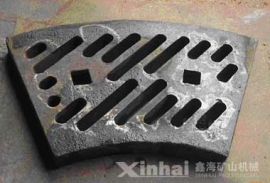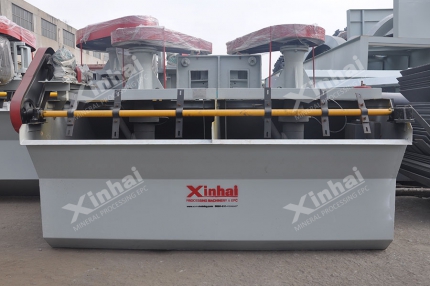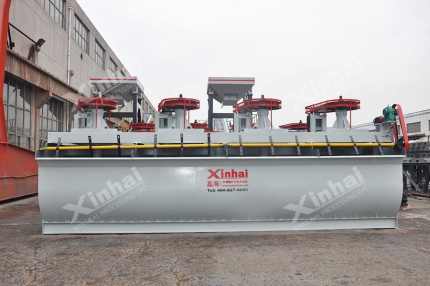Nickel deposits in the world can be divided into three categories: copper-nickel sulfide ore, laterite nickel ore and weathered crust nickel silicate ore. At present, nickel sulfide ore is the main source of nickel metal. Although the extraction of nickel from nickel oxide ore is becoming more and more popular, nickel sulfide ore is still the main source of nickel. The main reason is that economical mechanical beneficiation methods can be used to extract nickel metal from nickel sulfide ore, but nickel oxide ore cannot. The following will introduce several beneficiation processes of copper-nickel sulfide ore.

Use the table of contents below to navigate through the guide:
01Heavy media beneficiation process of copper-nickel sulfide ore
The heavy medium beneficiation process, also known as the heavy suspension beneficiation process, is a more economical method for ore separation. This process can separate dense ore and disseminated ore in the form of heavy products and light products respectively, and the higher the yield of light products, the higher the recovery rate of valuable components in the concentrate during flotation. When using this method, the compact and disseminated ores are separated first, and then the concentrates are separated by flotation, which can maximize the recovery of concentrates. The dense medium beneficiation method of copper-nickel sulfide ore is to transform the traditional "soft" fluid into "rigid" fluid. The density of the suspension in the beneficiation process is kept at a high level, which can increase the yield of disseminated ore, reduce the content of copper and nickel in the flotation tailings, and then increase the recovery rate of concentrate.

02Copper-nickel sulfide ore flotation process
The flotation process is one of the commonly used beneficiation methods for nickel ore. For the treatment of copper-nickel sulfide ore, three flotation methods can be used: preferential flotation, mixed flotation and flash flotation.
Priority flotation method: There are two forms, namely direct priority flotation and partial priority flotation. The preferential flotation method is suitable for processing ores with copper content higher than nickel content, and can directly obtain copper concentrate with low nickel content. Therefore, in actual production, Xinhai Mining recommends considering whether it is suitable for this beneficiation method according to the nature of ore.

Mixed flotation method: Mixed flotation method is the method that most nickel ore processing plants are using. It mainly selects copper-nickel mixed concentrate, or smelts it to make high-grade nickel matte, and then sorts it, or uses other methods to realize the separation of copper-nickel concentrate.
(1) Separation of copper and nickel after smelting into high nickel matte
High nickel matte is a product of copper-nickel mixed concentrate through blast furnace smelting, the main components are Ni3S2 and Cu2S and a small amount of gold. When separating copper-nickel concentrate, high nickel matte can be separated by magnetic separator to remove alloy first, then sodium hydroxide is used as modifier and butyl xanthate as collector for flotation, and copper concentrate can be preferentially flotation.

(2) Direct separation of copper-nickel concentrate
Direct separation of copper-nickel concentrate can adjust the solid concentration to 20%, using lime as the medium. The ore slurry is aerated during flotation. At this time, the separation selectivity of copper and nickel is high, and higher-grade copper concentrate and nickel concentrate can be obtained, and the recovery rate of concentrate will also increase accordingly. The cost of this process is relatively low.
Flash flotation method: This method is to use a special flotation machine to process the sand settling of the hydrocyclone that is ground into a closed circuit with the raw ore, and the mixed concentrate obtained is then ground, and can be obtained mixed concentrate foam meeting quality requirements after a flash flotation. This method can reduce the load circulation of the grinding circuit and reduce the energy consumption of the grinding circuit. And the particle size of the obtained concentrate is relatively coarse, which is easy to filter, the cost of dehydration and filtration is reduced, and the moisture content of the final concentrate is correspondingly reduced. Flash flotation is a relatively economical flotation process.

03Magnetic flotation of copper-nickel sulfide ore
The magnetic separation and flotation of this process are completed simultaneously in the same device. This method can be used to treat magnetite ore and nickel ore, and it can prevent magnetic minerals from entering the froth product when non-magnetic minerals are flotation. This process combines two sorting processes in one process, which can reduce the processing times of intermediate materials and simplify the process flow.

The above are several sorting processes for copper-nickel sulfide ore, and different process flows can be selected according to the properties of the ore. Xinhai Mining recommends that before designing the beneficiation process, the beneficiation test should be carried out in order to customize an efficient nickel ore beneficiation process. The mine manager of Xinhai can provide you with nickel ore beneficiation turnkey services, if necessary, please consult.


 marketing@ytxinhai.com
marketing@ytxinhai.com  0086 13810327080
0086 13810327080 






































































































 CHAT
CHAT MESSAGE
MESSAGE








